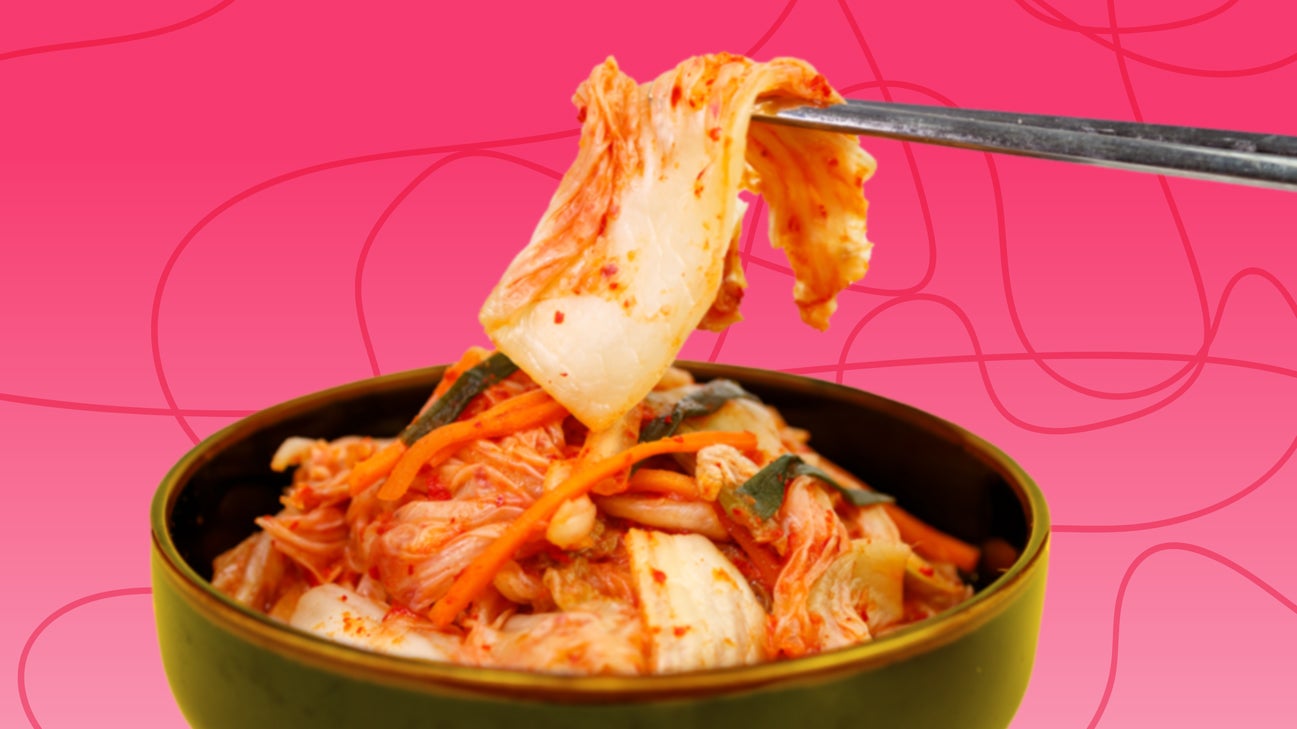We love carbs! And bacteria love them, too.
When certain bacteria strains eat sugar, they convert that sugar into alcohols or acids. (That’s the fermentation process.)
Some popular results of fermentation are spirits (like vodka), veggies (like kimchi), and chemicals like (lactic acid). Lactic acid is a totally normal byproduct of this process that’s in lots of foods. Here’s what you need to know about it.
Which foods have lactic acid?
Lactic acid occurs naturally in fermented foods, but it can also be added to help preserve or flavor packaged foods.
Common lactic acid-rich foods include:
- pickled veggies (like pickles, sauerkraut)
- sourdough bread
- cured meats
- wine
- fermented soy foods (including soy sauce and miso)
- fermented dairy (like kefir and yogurt)
- kombucha
Lactic acid is generally considered safe, but when there’s too much of it (like a bloated bottle of salad dressing) it could mean that your food’s gone bad.

Lactic acid in food
Lactic acid bacteria have been used for about 40 centuries to protect food from microbes. And they’re not new to your body, either. These bacteria like to hang out in your gut.
Lactic acid can extend foods’ shelf life and give products different tastes and textures. The FDA recognizes lactic acid as generally safe to use in a variety of ways, including:
- antimicrobial agent
- curing and pickling agent
- flavor enhancer
- pH control agent
- solvent
It isn’t approved, though, to be used in baby food or infant formula.
Should you avoid lactic acid?
For most people, eating foods with lactic acid doesn’t come with any negative side effects. In fact, a research review showed a positive side to enjoying lactic-acid rich foods.
In some cases, lactic acid arrives when it isn’t welcome. Although one of its main roles in the food industry is to keep things preserved, it can also make foods spoil faster. Foods that have a low pH (acidic foods) and vacuum-sealed products can be especially susceptible to lactic acid spoilage. This includes foods like processed meats, tomato-based sauces, and salad dressings.
Have you ever seen one of your salad dressing bottles or milk jugs bloat up? That’s lactic acid producing gas. You should toss it in the trash.
Veg out! Is lactic acid vegan?
Sometimes the name “lactic acid” throws up a red flag for people following a vegan diet. “Lactic” sounds like “lactose“, a naturally occurring sugar found in dairy. But these two aren’t related.
Lactic acid can be found in meat and dairy products by feeding off the lactose, but most of the time lactic acid is formed from plant-based sources.
According to the USDA, lactic acid is typically produced by fermenting “dextrose (from corn), sucrose (from sugarcane or sugar beets), or starch (from barley, corn, malt, potato, rice, tapioca, or wheat).” All these sources are vegan-friendly.
There may be cases of lactic acid produced from an animal source, though. You can call the manufacturer directly to find out how the lactic acid in a certain product was created.
Potential health benefits
Pop open that jar of pickles and enjoy the health benefits that lactic acid (and the bacteria that produce it) may bring.
- Improves gut health. Fermented foods contain live probiotics that can help strengthen your gut microbiome. Having a healthy gut can improve your immune system, digestion, and even your sleep. A small research review of 19 studies found promising evidence that eating fermented foods can adjust your gut microbiome, but more research is needed.
- Increases nutrient absorption. Sometimes your gut needs help absorbing all the nutrients that you eat. When your gut microbiome isn’t “balanced,” it can impact your small intestine (your organ that works to utilize these nutrients). A research review suggested that supplements containing lactic acid bacteria can improve nutrient absorption.
- Antioxidant effects. One research review suggested that fermented foods can also make other compounds, such as vitamins and exopolysaccharides, more accessible. This improves your antioxidant activity, which helps prevent oxidative stress. Oxidative stress is when too many free radicals float around in your cells. Free radicals form from normal metabolism or exposure to things, like chemicals, air pollutants, and cigarette smoke. Free radicals also damage your body and link to age- and diet-related chronic conditions.
- Supports your immune system. According to a study, a substance formed by lactic acid bacteria may benefit your immune system. This could be beneficial in treating inflammatory diseases. These include conditions like arthritis, asthma, and inflammatory bowel disease.
According to a research review, other benefits of lactic acid could include:
- lower blood pressure
- better protein digestion
- reduced FODMAPs (improperly digested carbohydrates that can worsen irritable bowel syndrome)
- lessened lactose intolerance
- extra essential vitamins
tl;dr
Lactic acid is a naturally occurring or man-made acid that can help preserve foods and enhance flavor. It’s found in foods that have been fermented (like including pickles, sauerkraut, kefir, and sourdough bread). The fermentation process typically uses plant-based sugars, so it’s generally vegan-friendly.
And lactic acid doesn’t just extend the shelf life of foods. It also comes along with potential health benefits including improved gut health, immune system support, and antioxidant effects.
0 Commentaires